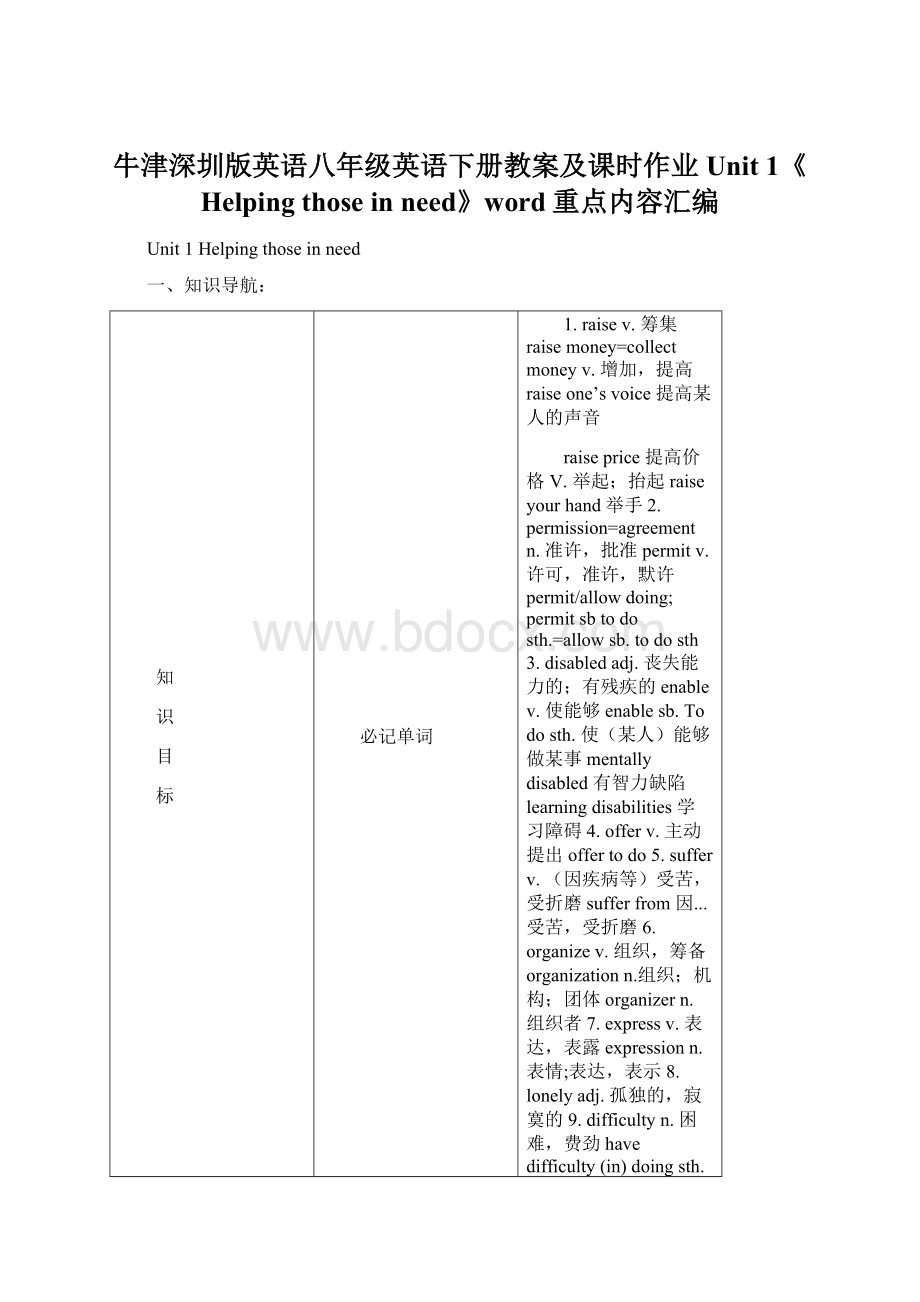牛津深圳版英语八年级英语下册教案及课时作业Unit 1《Helping those in need》word重点内容汇编.docx
《牛津深圳版英语八年级英语下册教案及课时作业Unit 1《Helping those in need》word重点内容汇编.docx》由会员分享,可在线阅读,更多相关《牛津深圳版英语八年级英语下册教案及课时作业Unit 1《Helping those in need》word重点内容汇编.docx(19页珍藏版)》请在冰豆网上搜索。

牛津深圳版英语八年级英语下册教案及课时作业Unit1《Helpingthoseinneed》word重点内容汇编
Unit1Helpingthoseinneed
一、知识导航:
知
识
目
标
必记单词
1.raisev.筹集raisemoney=collectmoneyv.增加,提高raiseone’svoice提高某人的声音
raiseprice提高价格V.举起;抬起raiseyourhand举手2.permission=agreementn.准许,批准permitv.许可,准许,默许permit/allowdoing;permitsbtodosth.=allowsb.todosth3.disabledadj.丧失能力的;有残疾的enablev.使能够enablesb.Todosth.使(某人)能够做某事mentallydisabled有智力缺陷learningdisabilities学习障碍4.offerv.主动提出offertodo5.sufferv.(因疾病等)受苦,受折磨sufferfrom因...受苦,受折磨6.organizev.组织,筹备organizationn.组织;机构;团体organizern.组织者7.expressv.表达,表露expressionn.表情;表达,表示8.lonelyadj.孤独的,寂寞的9.difficultyn.困难,费劲havedifficulty(in)doingsth.indifficulty/difficulties处境困难
difficultadj.困难的10.joyn.愉快,喜悦toone’sjoy令人高兴的是,使某人高兴的是enjoyv.享有,享受;欣赏;喜欢;使过得快活enjoyableadj.愉快的joyfuladj.快乐的,高兴的;令人开心的,使人喜悦的11.couragen.勇气;勇敢encouragev.鼓励encouragesb.todosth.鼓励某人做某事encouragementn.鼓励,激励12.payoff偿清(债务);支付(债务)的全部数额payattentionto注意payavisitto去参观,拜访payfor为……付款
13.teenagern.青少年seriousadj.严重的illnessn.(某种)病illadj.生病的;坏的;fallill病倒了;feelill感觉不舒服;speakillofsb.说某人的短处painn.痛苦,苦恼lonelyadj.孤独的;寂寞的friendshipn.友谊peacen.平静;宁静peacefuladj.和平的;爱好和平的;安静的;平静的hurtv.(使)疼痛,受伤spiritsn.情绪,心情communityn.社区
常考短语
1.askpermission报请批准2.voluntarywork义务性工作volunteern.志愿者voluntaryadj.自愿的;自发的;无偿的3.inneed需要帮助的4.sufferfrom因...受苦,受折磨5.raiseone’sspirits使振奋;使鼓起勇气6.inorderto目的在于,为了7.givesb.ahand=helpsb.帮助某人8.takephotosof给...拍照9.inthefuture在将来10.beafraidof害怕11.sothat为的是,以便12.inhospital生病住院13.takepartin参加14.millionsof数百万的15.becauseof因为16.sincethen从那时起17.closeto靠近
经典句型
1.Cindyisinhospitalbecauseshesufferedfromseriousillnesses.
2.Theyhavedifficultywalkingormoving.
3.Wouldyouliketotakepartinthecompetition?
4.Herparentsdiedinacaraccident,andsheisunhappyandverylonely.
重点语法
动词不定式
教学策略
1.在教学中以学生为主导,通过学生自己的回忆复习发现其存在的薄弱环节,教师进行针对性的讲解
2.歌诀助记:
接动词不定式作宾语的动词3.歌诀助记:
need的用法和不定代词的用法
知识技能目标
1.熟练掌握Unit1重点单词,短语,句型2.掌握动词不定式用法
二、要点全解:
1.raise(v)筹募(钱);增加,提高;举起;提出;养育(raise=keep有“饲养,抚养”的意思)
第三人称单数:
raises过去式:
raised过去分词:
raised现在分词:
raising
1.WeraisedsomemoneyfortheProjectofHope.
2.Ifyouanswertheteacher’squestions,youmustraiseyourhand.
3.Thebookraisesmanyimportantquestions.
4.Thelocalgovernmentraisedthepriceofhouse.
5.Theywerebothraisedinapoorfamily.
搭配:
raiseone’svoice提高嗓门;raiseafamily养家糊口;raisemoney筹款;raiseprice提高价格;
raiseone’sspirits打起精神;raisecattle=keepcattle(饲养牲口);raisechildren(抚养孩子)
辨析:
raise,rise(rise--rose--risen)的区别:
(1)这两个词都有“提高,上升,增加”的意思,但其用法不同。
raise是及物动词,其主语通常是人;而rise是不及物动词,其主语通常是物。
例如:
Thesunrisesandbathestheearth.太阳升起,普照大地。
(2)raise和rise用于同一事物时含义不同,raise是人为增加或提高,而rise是自然增加或提高。
例如:
ThepriceofTVsetshasbeenraisedrecently.最近电视机提价了。
(政府或厂家主动行动)
ThepriceofTVsetshasrisenrecently.最近电视机提价了。
(市场调节)
2.permission(n.)允许=agreement准许;批准
例如:
Withoutpermission,youmustn’tentertheteachers’office.
同根词:
permitv.许可,准许;默许permit---permitted----permitted
permitsb.todosth.=allowsb.todosth允许某人做某事
例如:
Theguardspermittedmetobringmycameraandtaperecorder.
辨析:
permit,allow,let的区别:
permit/allowdoingsth.允许做某事
permit/allowsb.todosth.允许某人做某事
letsb.dosth.让某人做某事
allow与permit在很多情况下意义是相同的,可换用。
但allow侧重听任或默许,即不加阻止,语气较轻;
permit通常指上级、规则或法令等表示的准许,指给予做某事的权利,如通过法令和正式条文“允许”做某事,语气较重;
let指允许某人做某事,含有不加限制之意,多用于口语中,后面接不带to的动词不定式作宾语补足语。
3.Ihelpedsickchildren.sickadj.生病的asickman/thesick病人
【辨析】sickandill:
sickadj.
(1)作表语,生病的,恶心的Hiswifewassickinbedwithacold.
(2)作定语,生病的Jackislookingafterhissickmother.
illadj.
(1)作表语,生病的Hehasbeenillforaboutamonth.
(2)作定语,坏的Theillboylovesplayingtricksonhiselderbrother.
4.Itaughtdisabledchildrentosing.
disabled英[dɪs'eɪbld]adj.残废的;有缺陷的用作形容词(adj.)
同根词:
disablev.=make(sb.)unabletodosth.使无能力;使残废,使伤残
enablev.=make(sb.)abletodosth.使(某人)能够做某事
teachsb.todo.sth.教某人做某事
invitesbtodosth(邀请某人做事),persuadesbtodosth(成功劝说某人做某事),teachsbtodosth(教某人做某事),tellsbtodosth(告诉某人做某事),wantsbtodosth(想要某人做某事),wishsbtodosth(希望某人做某事)
5.Threeteenagersofferedtodosomevoluntaryworkduringtheschoolholidays.
offertodosth.(主动)提出做某事Tomofferedtodriveustothebusstation.
offersth.提出某事Heofferedagoodplanforourholiday.
offersb.Sth./offersth.tosb.(主动)给某人提供某物Weshouldofferothersourhelp.
(1)辨析:
provide,offer的区别:
provide用于表示无主动慷慨之意地为人或物提供需要或有用的东西,仅仅是出于某种责任,强调提供必须用
的东西,尤其是生活用品。
常用于providesb.withsth.或providesth.forsb.的固定搭配中。
offer表示主动提供服务、工作等。
常用于offersb.sth.或offersth.tosb.固定搭配中。
例如:
offersb.主动提出帮助某人;offersb.agoodsalary给某人一个好工资。
(2)辨析:
during,in与for
during
用于某事是在某一段时间之内发生时,强调动作或状态的持续性
Duringthosethreemonthsheaskedalotofquestions.
in
一般情况下可与“during”互换,但表示某一动作发生在某一时间段内时,宜用in
WeusuallytakeaholidayinJuly.
for
用于某事持续多久时
Tomwasinschoolforonlythreemonths.
6.Thechildrenthereallsufferfromseriousillnesses.suffer(名词)suffering
sufferfromsth.因某事受苦、受折磨,其后常接表示疾病、痛苦、寒冷、饥饿悲伤等的词语
Manyteenagersaresufferingfromthecomputergames.
suffer(vt.)和sufferfrom的区别:
suffer指一般的损害、痛苦等等,但sufferfrom指长期的或习惯性的痛苦或困难。
suffer:
1.感到疼痛、痛苦Hediedveryquickly,hedidn'tsuffermuch.他死得很快,没有多少痛苦.
2.承受,遭受Youmustbepreparedtosufferconsequences.你要准备承担后果.
sufferfrom:
1.患有(疾病等)Shesuffersfromheadache.她患头痛病
2.为...所苦,因...而吃苦头I'msufferingfromareallackoftimethisweek.我这周为时间不够用而苦。
suffertheresult/heavylosses/injuries承受结果/遭受大损失/负伤
sufferfromheadache/illness遭受头痛/疾病的困扰
7.Wetaughtthemtotellstories.tellv.讲述,告诉tellstories讲故事
【辨析】tell,talk,speak,say:
Tell,告诉,讲述表示把某件事或某条信息传达给别人,也可以表示“讲故事”,“说谎话”(tellalie)
Talk,交谈,谈话talkto/withsb.与某人交谈talkabout谈论
Speak,说,发言常用来指说某种语言,也可以指发言等speakEnglish
Say,说,强调说的内容
Eg:
(1)Helikestotelljokes.
(2)Theteachertalkedtohimjustnow.
(3)HecanspeakJapaneseandChinese.(4)CanyousayitinEnglish?
8.helpthemexpresstheirfeeling:
帮助他们表达感受
Helpsbdo(todo)sth:
帮助某人做某事
E.g.:
IalwayshelpmymothercleanthehouseonSundays.
expressv.表达;表露。
同根词:
expressionn.表现,表示,表达;表情
E.g.:
Thishelpsthemexpresstheirfeelings.这有助于他们表达他们的情感。
Shegaveexpressiontohersadness.她流露出了悲伤之情。
9.WespendtimewithagirlcalledVivien.spendv.度过,消磨
spendtimewithsb:
和某人一起,与某人度过时光;花费时间和某人在一起;
spendtime/moneyindoingsth:
花费时间/金钱做某事
spendtime/moneyonsth:
花费时间/金钱在某事上
【拓展】四花费(spend,pay,cost,take)的用法:
人+spend(spent)+时间/金钱+onsth./(in)doingsth.人+pay(paid)+钱+for+物
物+cost(cost)+sb.+金钱Ittakes(took)sb.sometimetodosth.
E.g.:
Ispent200yuanonthebag.=Ipaid200yuanforthebag.=Iboughtthebagfor200yuan.
跟踪练习
1.Theyspendtoomuchtimethereport.
A.writingB.towriteC.onwritingD.write
2.--WillyoupleaseformydinnerPeter?
--Sure!
A.spendB.payC.costD.take
3.Itwillmetoomuchtimetoreadthisbook.
A.takeB.costC.spendD.pay
4.Thissciencebook____meagreatamountof money.
A.tookB.costC.usedD.spent
5.--TheT-shirtlooksniceonyou!
Howmuchdoesit____?
--Ijust_____tendollarsforit.
A.take;affordedB.cost;paidC.cost;spentD.costs;spend
10.Herparentsdiedinacaraccident,andsheisunhappyandverylonely.
(1)diev.死dying,现在分词deadadj.死去的thedead死人deathn.死亡
(2)unhappyadj.伤心的,不快乐的
【拓展】构词法讲解:
前缀
1)大多数形容词加un-构成反义词(un)able,(un)friendly
2)以c或者e开头的形容词通常加in-构成形容词(in)correct,(in)expensive
3)以p开头的形容词通常加im-构成形容词(im)polite,(im)possible
4)以r开头的形容词通常加ir-构成形容词(ir)regular
5)有些形容词加dis-构成反义词(dis)honest
(3)lonelyadj.孤独的,寂寞的Heledalonelylifewithfewfriends.
【辨析】lonely,alone的用法区别:
【一言辨异】Iwastravellingaloneinthelonelymountain.Ididn’tfeellonelythoughIwasalone.
lonely
形容词
表语
孤独的;寂寞的
定语
偏僻的;荒凉的
alone
形容词
表语
孤单的;孤独的
副词
状语
单独地;独自地
跟踪练习:
Thoughhisgrandparentlives____,heneverfeel_____.
A.alone;aloneB.alone;lonelyC.lonely;lonelyD.lonely;alone
11.Sheneedsfriendship.
need:
此处为实义动词,意为“需要”。
后面可接名词、代词或动词不定式。
E.g.:
Theydon’tneedanyhelp./Heneedstohaveagoodrest.
【注意】need后接动词-ing形式时表示被动意义。
Theflowersneedwatering.
【拓展】need作情态动词时,没有人称和数的变化,后接动词原形,主要用于否定句和疑问句中。
Youneedn’tbecomeverynervous.
-MustIbringmyhomeworknow?
–No,youneedn’t.Youcanbringittomorrow.
Need的用法总结
实义动词表“需要”,后接名、代、不定式。
Need后接动名词,主动形式表被动。
情态动词表“需要”,没有时态、数、人称。
其后直接跟动词,用于疑问和否定。
12.MymotherandIwillcontinuetovisitVivien.
Continuevt.continuetodo/continuedoing继续做某事Theycontinuedtoread/readingthebook.
vi.继续,连续,延伸Thesnowcontinuedfortwodays.
continuewithsth.使某事物继续存在或不断发生Youcancontinuewithyourwork.
13.Theyhavedifficultywalkingormoving.
havedifficulty(in)doing/havedifficultywithsth.
Ihavedifficultyin(solving)theproblem.
【拓展】havetrouble(in)doing做某事有麻烦;
haveproblems(in)doing做某事有问题;
havefun(in)doing做某事有乐趣
跟踪练习
Ihavegreattroublein____________(finish)theworkbymyself.Couldyouhelpme?
14.Itaughtthemtosingbecausemusiccanbringthemjoyandpeace.
bring:
及物动词,意为“带来”。
【辨析】bring,take,get,carry
bring
从某处将某人或某物“带来”,后面常接双宾语
→来
Remembertobringmethepictures.
take
将某人或某物从说话人处“带到”另一处
去→
Iwon’ttakeyouthere.
get
去某处将某人或某物“带到”说话人处
去
来
Pleasegetsomepaperforme.
carry
强调“负重”或“搬运”
无
Hecarriedababyonhisback.
跟踪练习Please______thebooktoMr.Blackwhenyougotoseehim,OK?
A.takeB.bringC.getD.carry
15.Weneedtohelpchildrenl